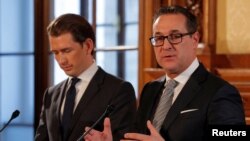Austria's conservative People's Party and the far-right Freedom Party (FPO) said Friday that they had agreed on a commitment to the European Union and budget discipline as well as cuts in migrants' welfare benefits as basic policies for a new coalition government.
People's Party leader Sebastian Kurz started coalition talks with the FPO last week after his party won a parliamentary election with 31.5 percent of the vote.
Kurz's hard line on immigration and his decision to force a collapse of the current coalition with the Social Democrats, who came in second, made the anti-immigration FPO a natural partner.
Some European leaders have expressed concern about the likely return to power of the FPO, which first became a major force in the 1990s under the late Joerg Haider, who praised Hitler's employment policies.
Austria's new government will focus on "actively shaping the Austrian EU Council presidency and a commitment to further develop the European Union according to the principle of subsidiarity," FPO chief Heinz-Christian Strache said at a news conference with Kurz in Vienna on Friday. Subsidiarity is the principle that power should be exercised at the lowest feasible level.
Austria will take on the rotating EU Council presidency for six months beginning in July 2018.
Slimmer, more focused EU
Kurz has repeatedly said that any government must have a clear pro-European orientation. However, like Strache, he wants the EU to slim down and focus mainly on core issues such as trade and securing external borders.
Kurz and Strache said they had also agreed to reduce inefficiencies in state spending to be able to cut taxes and meet EU budget criteria.
Finance Ministry projections last month forecast Austria's 2018 structural deficit at 1.1 percent of GDP, well above an EU limit of 0.5 percent.
"We are jointly committed to ensuring sustainable financing as the basis of our work," Kurz said. The goal was "not to spend more than is earned." Details will be negotiated between the parties, he said.
Both parties called in their election campaigns for tax cuts for low earners and for companies, and both promised not to introduce a wealth or inheritance tax.
To achieve this, they plan to reduce welfare benefits for migrants and consider introducing a five-year residence qualification for citizens of other EU countries to be eligible for welfare payments in Austria.
Three of Austria's nine provinces have already cut benefits for new arrivals, saying the system was being overstretched by an influx of refugees. Austria took in asylum seekers equivalent to more than 1 percent of its population in 2015, most of them fleeing conflict in the Middle East.





